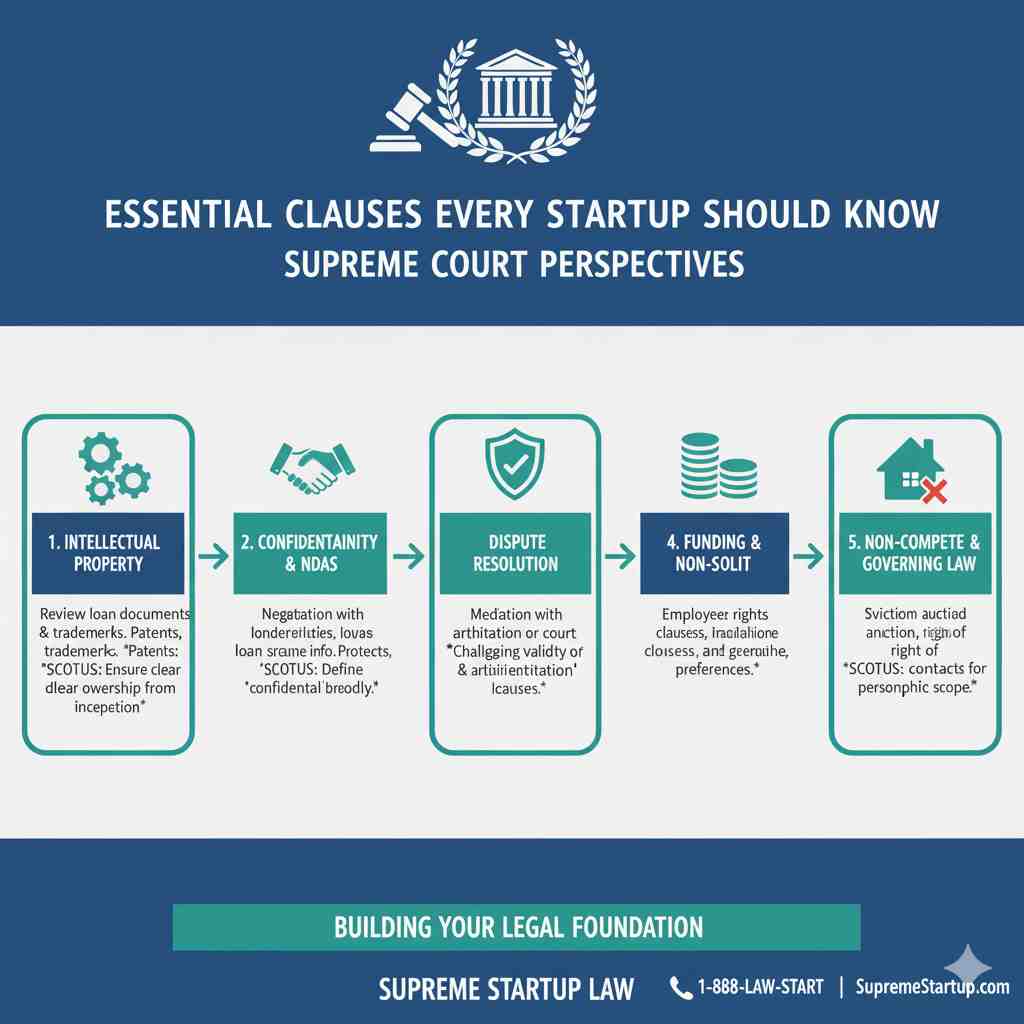Starting a new business is one of the most exciting journeys for any entrepreneur. However, behind every successful startup lies a solid legal foundation. A well-drafted contract protects your business from future disputes and ensures smooth operations. Over the years, the Supreme Court of India has delivered landmark judgments that define how certain clauses in business contracts are interpreted and enforced. At Apex Law Office LLP, we understand that most startups are so focused on growth, funding, and innovation that they often overlook legal documentation. This article explains, in simple terms, the essential clauses every startup should know, and how Supreme Court perspectives shape their importance in everyday business dealings.
Essential Clauses Every Startup Should Know: Supreme Court Perspectives – Apex Law Office LLP

Why Legal Clauses Matter for Startups
Legal clauses are not just formal language in contracts — they are your business’s shield against risk. A single missing or poorly written clause can lead to financial loss, partnership disputes, or even court cases.
The Supreme Court has repeatedly emphasized that contracts are binding legal documents that must be read and executed with utmost care. In several rulings, the Court has clarified that the intention of parties, the clarity of terms, and fairness in dealing are key to determining the enforceability of any agreement.
For startups, these principles mean one thing — every word in your contract matters. Having expert legal support ensures that your agreements protect your interests while staying compliant with Indian law.
1. The Founders’ Agreement Clause
Every startup begins with an idea and a group of passionate founders. However, disagreements among founders are one of the top reasons startups fail. A Founders’ Agreement clearly defines the roles, responsibilities, and ownership rights of each founder.
The Supreme Court, in various partnership and shareholder disputes, has held that the lack of clear terms can lead to ambiguity and conflict. Clauses must address:
- Percentage of ownership and equity distribution
- Decision-making authority
- Vesting and exit terms
- Dispute resolution between founders
At Apex Law Office LLP, we always advise startups to sign a Founders’ Agreement before incorporating the company. It’s far easier to prevent a dispute than to resolve one later in court.
2. The Confidentiality (NDA) Clause
Startups often operate on innovation — an idea, a product design, or a business model that sets them apart. A Non-Disclosure Agreement (NDA) protects sensitive information shared with employees, investors, or partners.
The Supreme Court of India, in multiple judgments, has reinforced that trade secrets and proprietary information must be protected through enforceable NDAs. Once a breach occurs, it can cause irreparable harm, especially for tech and intellectual property–driven startups.
Therefore, NDAs should specify:
- What information is confidential
- The period of confidentiality
- Penalties for breach
- Legal jurisdiction for disputes
Transitioning from idea to execution safely requires this legal wall of protection.
3. The Intellectual Property Ownership Clause
In the startup ecosystem, intellectual property (IP) is often the most valuable asset. Whether it’s software code, a mobile app, or a brand logo, ownership rights must be clear.
The Supreme Court has consistently ruled that ownership must belong to the entity that created or commissioned the work unless otherwise agreed in writing. For startups, that means ensuring all IP created by employees, freelancers, or developers is legally transferred to the company.
The clause should include:
- Assignment of IP rights to the company
- Restrictions on third-party use
- Procedures for handling IP created during employment
Without this clause, startups risk losing control over their most valuable creations.
4. The Non-Compete and Non-Solicitation Clause
Startups operate in highly competitive markets. A non-compete clause prevents employees or partners from starting a similar business immediately after leaving. Similarly, a non-solicitation clause stops them from poaching clients or team members.
However, the Supreme Court, under Section 27 of the Indian Contract Act, 1872, has clarified that agreements restraining trade are generally void, except in limited circumstances. This means non-compete clauses must be reasonable in duration, geography, and scope.
At Apex Law Office LLP, we draft balanced clauses that protect your business without violating the law. The goal is to safeguard legitimate business interests while staying enforceable under Supreme Court interpretations.
5. The Dispute Resolution and Arbitration Clause
Disputes are inevitable in business. What matters is how efficiently they are resolved. The Arbitration and Conciliation Act, 1996, as interpreted by the Supreme Court, provides a faster and confidential alternative to court litigation.
A strong dispute resolution clause should mention:
- The mode of resolution (arbitration, mediation, or litigation)
- The seat and language of arbitration
- The governing law
- Appointment of arbitrators
Recent Supreme Court judgments emphasize party autonomy — meaning, startups can choose how and where they want disputes resolved. Our legal experts ensure your dispute resolution clause aligns with global best practices and Indian law.
6. The Termination and Exit Clause
No contract lasts forever. Whether it’s an employment agreement, vendor contract, or partnership, an exit clause defines how and when the relationship can end.
The Supreme Court has ruled that contracts must provide clear termination conditions, failing which disputes arise over wrongful termination or damages. This clause should outline:
- Notice period requirements
- Grounds for termination (breach, insolvency, performance issues)
- Post-termination obligations
At Apex Law Office LLP, we ensure that every exit clause protects both parties fairly, reducing the likelihood of legal battles.
7. The Indemnity and Liability Clause
Startups often enter into agreements involving financial risks. An indemnity clause ensures that if one party suffers a loss due to another’s actions, they are compensated.
The Supreme Court, through its interpretations of Section 124 of the Indian Contract Act, has recognized indemnity as a powerful safeguard in commercial transactions. This clause is especially crucial when dealing with vendors, investors, or technology service providers.
A well-drafted indemnity clause clearly defines:
- The nature of losses covered
- Limits of liability
- Claim procedures and timelines
This simple but strong provision can save startups from devastating financial exposure.
8. The Governing Law and Jurisdiction Clause
Startups often work across cities or even countries. When disputes arise, deciding which court or law applies becomes vital.
The Supreme Court has consistently emphasized that jurisdiction must be clearly defined in contracts to avoid confusion and conflicting claims. This clause ensures that all parties know where they can file or defend a legal claim.
For example, a contract can specify that “This agreement shall be governed by the laws of India, and courts in Chennai shall have exclusive jurisdiction.”
At Apex Law Office LLP, we guide startups in selecting the appropriate governing law and jurisdiction based on their business operations.
9. The Force Majeure Clause
The COVID-19 pandemic highlighted the importance of the force majeure clause, which excuses parties from performing contractual obligations due to unforeseen events like natural disasters, war, or lockdowns.
The Supreme Court, in various judgments, has upheld the validity of such clauses, provided they are clear and unambiguous. For startups, this means drafting language that covers events beyond their control while ensuring continuity of essential obligations where possible.
Including this clause ensures your business remains legally protected in unpredictable circumstances.
10. The Data Protection and Privacy Clause
In today’s digital age, startups handle vast amounts of user data. With the introduction of the Digital Personal Data Protection Act, 2023, and evolving Supreme Court interpretations on the right to privacy, startups must take data handling seriously.
A privacy clause should define:
- How data will be collected, stored, and used
- User consent requirements
- Security measures to prevent data breaches
Our legal team ensures that your contracts comply with both the Supreme Court’s privacy rulings and the latest data protection laws in India.
How Supreme Court Perspectives Shape Startup Contracts
The Supreme Court’s judgments play a critical role in shaping how startup contracts are interpreted. The Court consistently upholds principles of fairness, transparency, and mutual consent. It discourages one-sided agreements that unfairly burden weaker parties, especially in employment and vendor relationships.
For startups, these perspectives highlight the importance of balanced and ethical drafting. Courts are more likely to enforce contracts that are fair, reasonable, and compliant with public policy.
By aligning contracts with Supreme Court precedents, startups not only reduce litigation risks but also build a foundation of trust with investors, employees, and partners.
Why Apex Law Office LLP is the Right Partner for Startups
At Apex Law Office LLP, we believe that every startup deserves legal clarity and protection from day one. Our team of corporate and commercial law experts specializes in drafting, reviewing, and negotiating startup contracts that meet both legal and business objectives.
Here’s what we offer:
- Customized legal documentation tailored to your startup’s needs
- Compliance reviews aligned with Supreme Court interpretations and latest laws
- Advisory support for founders, investors, and employees
- Representation in arbitration or litigation, if disputes arise
We combine legal precision with a deep understanding of startup dynamics — helping entrepreneurs grow confidently in a legally secure environment.
Frequently Asked Questions
Legal clauses act as the foundation of every business agreement. They define the rights, duties, and liabilities of all parties. For startups, these clauses prevent misunderstandings, protect intellectual property, and ensure compliance with Indian law. The Supreme Court has emphasized that well-drafted clauses reduce ambiguity and safeguard against unfair practices.
Every startup should include clauses related to founders’ rights, confidentiality, intellectual property, non-compete, dispute resolution, indemnity, governing law, and termination. These clauses help manage ownership, protect ideas, and define how disagreements are resolved. The Supreme Court’s interpretations guide how these clauses should be drafted and enforced.
The Supreme Court of India sets binding precedents on contract law. It interprets clauses based on fairness, intention, and reasonableness. For instance, it limits the enforceability of non-compete clauses and upholds arbitration as a valid dispute resolution method. Startups benefit by drafting agreements consistent with these legal principles.
Using free templates can be risky. Every startup’s structure, business model, and investor relationship differ. A clause that works for one company may not suit another. The Supreme Court has stressed that contracts must reflect genuine consent and specific terms. Legal experts can tailor agreements to your unique needs.
Apex Law Office LLP provides expert legal advice, drafts customized startup agreements, and ensures compliance with Supreme Court precedents. Our team helps founders understand legal obligations, minimize risks, and create fair, enforceable contracts that protect their long-term interests.
Final Thoughts
Every successful startup rests on two pillars — innovation and protection. While creativity drives growth, well-drafted legal clauses ensure stability. Supreme Court perspectives remind us that fairness, clarity, and intent matter more than complex wording.
By understanding and implementing these essential clauses, startups can prevent conflicts, attract investors, and strengthen their credibility.
At Apex Law Office LLP, we are committed to helping startups build that legal foundation. With our guidance, you can focus on innovation while we handle the law — ensuring your business not only takes off but also stays legally secure for years to come.
Read More
- Understanding FIR: Supreme Court Judgments You Should Know
- Top-Rated Legal Services for International Clients in Chennai
- Immigration and Corporate Legal Experts for Expats in Chennai
- Legal Help for Foreign Nationals in Chennai’s Business Hub
- Cross-Border Dispute Resolution Services in Chennai
- Startup India Portal (for startup-ecosystem regulatory & support matters)

